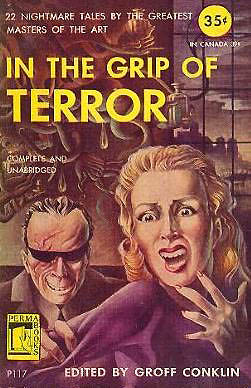| Logo | |
| Status | Defunct |
|---|---|
| Founded | 1948 |
| Successor | Pocket Books |
| Country of origin | United States |
| Publication types | Books |

Permabooks was a paperback division of Doubleday, established by Doubleday in 1948. Although published by Doubleday's Garden City Publishing Company in Garden City, Long Island, the Permabooks editorial office was located at 14 West 49th Street in Manhattan.
Contents
Promoted with the slogans Books of Permanent Value for Permanent Use and Books to Keep, the early Permabooks were priced at 35 cents. They did not feature the flexible covers usually associated with paperback books. Instead, as the name implies, the first Permabooks were designed in a more durable format with board covers. The interior looked like a paperback, but the exterior, measuring 4+3⁄8 in (110 mm) wide by 6+1⁄2 in (170 mm) tall, gave the impression of a reduced-size hardcover. The edges of the stiff, unflexible board cover extended 1⁄8 in (3 mm) past the trim of the interior pages. [1]
The concept was heralded in a back cover blurb:
- Permabooks combine the virtues of handiness for the pocket and durability for the library shelf. They are selected with care to provide reliable books for education and recreation. Each has been printed from new plates and bound in boards with special wear-resistant finish.
The initial format only lasted three years, with Doubleday switching to the standard paperback appearance in 1951, as indicated by Hyde Park Books' breakdown of the numbering sequence:
- The binding influenced editorial decisions. There was no sense publishing a durable book that no one had reason to keep, so the first titles were Best-Loved Poems, How to Write Letters, Best Quotations for All Occasions and other reference-style works. The numbering sequence: P1-P92, hardbacks; there was no P93; P94-P97, hardbacks; P98, paper; P99-P101, hard; P102 on were all paperback. Plus, P5, P7, P25, P65, P89 were re-issued as paperback without being re-numbered. In 1954, the company was purchased by Pocket Books, which began numbering Permabooks with M1000, skipped to M1600, skipped for the third title to M2001, skipped yet again to M3002 for the fourth title, and then numbered sequentially until M5014, when it jumped to M7500. [1]
The Perma Star imprint began in 1952. Perma Special, which also began that year, was a higher quality line selling for 50 cents. These imprints included originals by Richard Stark (a Donald E. Westlake pseudonym) and Ed McBain (an Evan Hunter pseudonym).
In 1954, Doubleday sold Permabooks to Pocket Books, which kept the Permabooks name as one of their imprints, issuing both originals and reprints. [2]

